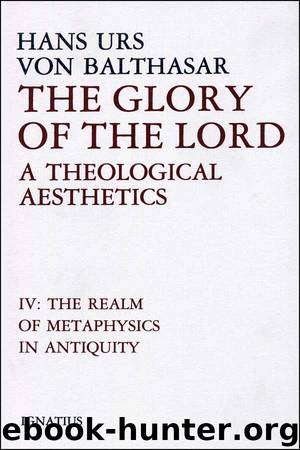The Glory of the Lord, Vol. 4 by Hans Urs von Balthasar

Author:Hans Urs von Balthasar [von Balthasar, Hans Urs]
Language: eng
Format: mobi
Tags: Spiritual & Religion
ISBN: 9780898702460
Publisher: Ignatius Press
Published: 1989-09-30T16:00:00+00:00
5. PLOTINUS
a. God in All and Above all
The second figure who sums up the achievement of the old world and offers it to the new is Plotinus (who died c. A.D. 270).235 Although chronologically post-Christian, he is still untouched by the Christian ethos, entirely caught up in his own vision in which he attempts to draw together and integrate all the philosophical awareness of the ancient world—the philosophical awareness and, even more, the religious awareness, since all the real value of myth is seen by him as summed up in religion, not in the inconsequential manner of the religious syncretism treated above, but in a passionate return to sources—as in Vergil—the sources where all things are still to be found together, not yet divided from each other. So too he moves beyond the dualism of myth (as revelation from God) and philosophy (as the victorious work of human thinking): for Plotinus, being itself is the divine and its total revelation is for him so overwhelmingly glorious that it far outshines all the splendours of particular myths. Plotinus refers to a great many myths—not just to resolve them into cosmological assertions in the old allegorical fashion but to elucidate how the single and complete theological revelation of being appears in them. His thought, through often taking its point of departure in scholastic-type problems, is not a school orthodoxy; he is not a disciple but a founder; his thought both has a spare, economical exactitude (he makes very sparing use of ὑπερ-formulae) and is inspired and pervaded by a silent bright glow of intensity. Like Vergil, he is ‘an uncommonly pure and unassuming personality’236 who lives in silent and unrecognised retirement in Rome, enjoying high honour only in a select circle of cognoscenti; aristocratic Romans entrust him with the guardianship of their children; incurably sick and shunned by his disciples, he dies alone on an estate in the Campagna. There have already been hints enough given about his legacy to European thought—not to mention Arabic as well; it is through him that the entire heritage of classical thought is authoritatively transmitted to the most intellectually powerful of the Church Fathers Gregory of Nyssa, Augustine, Dionysius, Maximus; they vie with him in the task of providing an exhaustive metaphysical account of being. The scholastic conception of philosophy is coloured by him, from Boethius and Eriugena to Albert, Bonaventure, Thomas, Eckhart, Dante, Nicholas of Cusa, Gerson and Ficino. It is to him that the humanists turn back to open up afresh the vision of a holy and whole totality of being, beyond the dust of the schools, and to him that those thinkers turn who are rapt by the vision of the unity of all things and its glory, once the Stoicism of the Baroque age and the Enlightenment are past—Bruno, Shaftesbury, Herder. In him Hegel recognizes his one great predecessor; and it is in terms of Hegel237 that Plotinus today is often interpreted, in the hope of finding there a speculative justification for his system.
Download
This site does not store any files on its server. We only index and link to content provided by other sites. Please contact the content providers to delete copyright contents if any and email us, we'll remove relevant links or contents immediately.
The Lost Art of Listening by Michael P. Nichols(6472)
Why I Am Not A Calvinist by Dr. Peter S. Ruckman(3769)
The Rosicrucians by Christopher McIntosh(3049)
Wicca: a guide for the solitary practitioner by Scott Cunningham(2704)
Signature in the Cell: DNA and the Evidence for Intelligent Design by Stephen C. Meyer(2501)
Real Sex by Lauren F. Winner(2474)
The Holy Spirit by Billy Graham(2416)
To Light a Sacred Flame by Silver RavenWolf(2353)
The End of Faith by Sam Harris(2288)
The Gnostic Gospels by Pagels Elaine(2026)
Nine Parts of Desire by Geraldine Brooks(2006)
Waking Up by Sam Harris(1958)
Heavens on Earth by Michael Shermer(1955)
Devil, The by Almond Philip C(1899)
Jesus by Paul Johnson(1887)
The God delusion by Richard Dawkins(1848)
Kundalini by Gopi Krishna(1824)
Chosen by God by R. C. Sproul(1760)
The Nature of Consciousness by Rupert Spira(1689)
